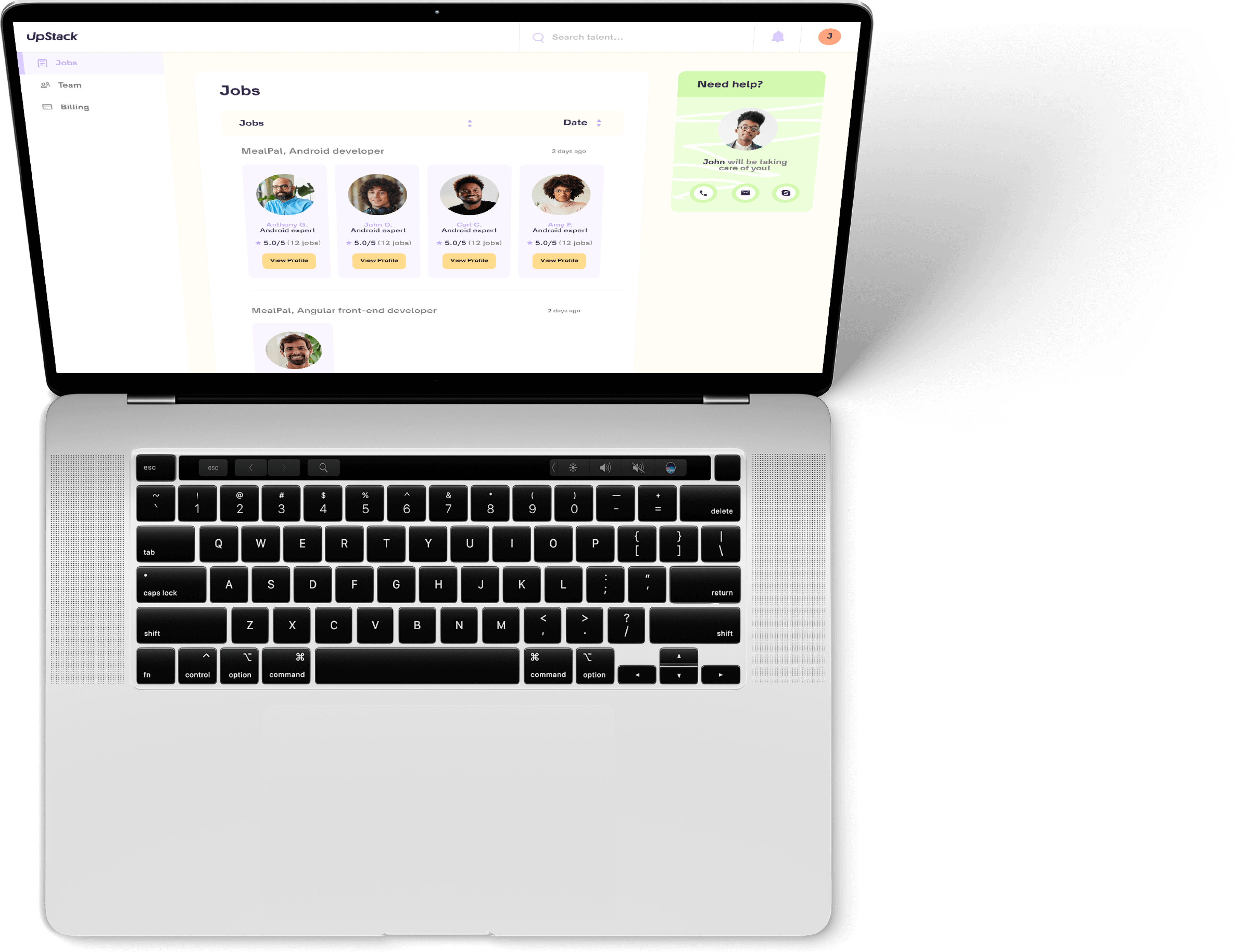


Hire Solidity Developers Remotely {Devs Ready!}
Stella B.
Available
Solidity Developer
-
Experienced Solidity engineer with seamless project implementation
-
Loves guacamole & hates spoilers

-
Marcus T.
Available
Solidity Engineer
-
Stacked portfolio of beautiful, functional websites
-
Known for his epic charcuterie & cheese boards

-
David M.
Available
Mobile Developer
-
Mobile engineering guru with a knack for translating stakeholder needs
-
Would rather be diving Palau’s Blue Corner

-
Top UpStack Solidity Developers
Hire Solidity Developers with Upstack
Hiring a Solidity developer for your blockchain project is an important decision and one that should not be taken lightly. Solidity developers are responsible for writing the code that will ultimately power your blockchain, making them an invaluable asset to any project. This guide will provide you with crucial information to help you find the right Solidity developer for your project. We'll cover topics such as what to look for in a Solidity programmer, what questions to ask during the interview process, and how to evaluate candidates. With the help of this guide, you'll be able to find the perfect Solidity developer to power your blockchain project and bring it to life.
What is a Solidity Developer?
A Solidity developer is a programmer who specializes in coding with Solidity, a programming language used to write smart contracts on Ethereum. They are responsible for writing the code that will ultimately power your blockchain, making them an invaluable asset to any blockchain project. Solidity developers are also typically responsible for testing and debugging their code. Solidity is a programming language designed to create smart contracts that run on Ethereum. It is a statically typed language with syntax very similar to the programming language Javascript. Solidity was created in 2014 by Gavin Wood, who was one of the co-founders of Ethereum. Solidity is a contract-oriented language that allows developers to write code that controls digital assets. When you hire a Solidity developer for your project, you are hiring a programmer who specializes in writing code with Solidity. The Solidity developer will write code that will dictate the functionality of your blockchain, making them an invaluable asset to any project.
What to Look for When Hiring a Solidity Programmer
One of the most important aspects of hiring a Solidity developer is finding someone whose skills align with the project’s goals and objectives. The best way to do this is by creating a job specification that outlines the project’s requirements. This will help you find candidates who specialize in the skills needed to meet your project’s objectives. Here are a few things you should consider while creating your job specification: - What is the project’s purpose? - What are the project’s key requirements? - What is the project’s scope? - What is the project’s timeline? Once you have your job specification in place, you can begin searching for Solidity developers who meet your project requirements. As you search for qualified candidates, keep these three things in mind: skill, experience, and budget. Skill - Is the candidate’s skill set aligned with your project’s requirements? Are they proficient in the languages, tools, and methodologies needed to complete the project? Experience - How much experience does the candidate have in their field of expertise? Budget - Will the candidate’s price reflect their skill set? Is their price tag in alignment with your project budget? Having clear ideas about these three factors will help you find a candidate who specializes in the skills needed to meet your project’s objectives.
Reviewing CVs and Resumes
As you begin reviewing Solidity programmer resumes and CVs, you should look for a few key pieces of information. First, you should ensure the candidate is a qualified candidate. Second, you should determine whether or not their skill set aligns with your project requirements. Finally, you should check to see if their resume and/or CV is professional and well-written. To ensure the candidate is qualified, you should look for a few key items on their resume. These include degrees, years of experience, and relevant skills. You can also check out online resume databases like Angel.co or Monster.com to find qualified candidates. To determine if the candidate’s skill set aligns with your project requirements, you should look for experience in the relevant fields. For example, if you’re hiring a Solidity developer to write code for a supply chain blockchain, you should look for candidates with experience in supply chain management and blockchain development. Finally, you should check the CV and/or resume for spelling and grammatical errors. This will help you determine if the candidate’s resume and CV are professional and well-written.
What Questions to Ask During the Interview Process
As you interview Solidity programmer candidates, you should ask a few key questions designed to glean information about their skill set and experience. By asking the right questions, you’ll be able to determine if the candidate is a good fit for your project. Here are a few questions to ask during the interview process: - What is the candidate’s experience with the language(s) you plan to use for the project? - What programming languages does the candidate use most often? - What is the candidate’s experience with the methodologies and tools used in the project? - What is the candidate’s experience with the blockchain platform you’re using for the project? - What is the candidate’s experience with the project’s requirements? - What are the candidate’s strengths? - What are the candidate’s weaknesses? - Do they have references that can attest to their work? As you ask these questions, you’ll be able to determine if the candidate is a good fit for your project. You’ll also be able to see if the candidate’s skill set matches the requirements of your project.
Evaluating Solidity Developer Candidates
Once you’ve found a few Solidity developer candidates, it’s time to evaluate their skill sets. You can do this by asking them to complete a sample project or by reviewing their references. If you want to determine if a candidate is skilled enough to work on your project, you can ask them to complete a sample project. You can also ask for a sample of the candidate’s code. While reviewing the sample code, look for things like project structure, code quality, and use of best practices. The code should be well-written, easy to read and understand, and follow the project’s requirements. Another way to evaluate candidate skill sets is by reviewing references. You can ask the candidate for references that can attest to their skill sets and work ethic. Alternatively, you can ask references for their thoughts on the candidate.
Tips for Making the Decision
Once you’ve found the right Solidity programmer for your project, it’s time to make the decision. Before hiring a candidate, you’ll want to make sure they are a good fit for your team. You can do this by asking the following questions: - Is the candidate a good cultural fit? - Does the candidate have the experience your project requires? - Does the candidate have the required skill set? - Does the candidate have a realistic and attainable project timeline? - Does the candidate have a competitive price? If the candidate passes these questions, it’s time to make the decision.
They trust Our Solidity Developers
Why hire a Solidity developer with Upstack
![Solidity Developer and Programmer Icon]()
Top Solidity talent pre-vetted for a perfect fit.
Our 8-point assessment evaluation ensures that every senior Solidity developer you interview exceeds expectations across technical, cultural, and language criteria.
![Solidity Programmers Computer Icon]()
Hire reliable, passionate Solidity developers.
From late-night sprints to jumping on a last-minute face-to-face, we ensure that your recruits are down to get the job done right.
![Solidity Programmers High Five Icon]()
Risk-free 14-day trial.
Confidently onboard candidates with our no-questions-asked trial period. We’ll walk you through the contract-to-hire process if and when you’re ready to make it permanent with your new Solidity engineer.
![Solidity Computer Programmer Icon]()
Our Client Success Experts provide white-glove service.
Stay laser-focused on your business goals while our team of experts curates potential candidates and manages seamless programmer onboarding.
![Solidity Developer Writing Notes Icon]()
Build your optimal team confidently, quickly.
UpStack handles everything including background and reference checks, legal issues, and more. Our platform streamlines billing, timesheets, and payment all in one easy-to-access place.
Schedule a call with a Client Success Expert to get starting hiring a Solidity developer.
Start hiring Start hiring Start hiring
Hire from the Best.
Working with our Client Success Experts, we’ll help you build the remote team of your dreams with top Solidity talent from around the world.
Pre-vetted, reliable Solidity developers are standing by. Learn more about us and why UpStack is the perfect toptal alternative.





Hiring Solidity Developers | FAQs
How much does it cost to hire a Solidity developer?
UpStack has a simple billing model where each Solidity developer has a standard hourly rate averaging between $65-$75 per hour. Rates are based on skills, knowledge, and experience, and our developers are available mainly for full-time engagement (40 hours per week) and the occasional part-time opportunity (20 hours per week).
What is the process to find a Solidity developer?
You’ll connect with an UpStack Client Success Manager to determine your immediate needs. Our team uses a combination of AI and personal assessment to short-list candidates that match your job requirements. From there, you interview, select, and onboard the perfect developer, all within days of your initial call.
How does UpStack find its Solidity developers?
UpStack’s talent recruitment team connects with software developers around the globe every day. Each Solidity programmer is vetted for technical, communication, and other soft skills necessary for a developer to successfully work with your team. Once vetted, the candidates are accepted into the UpStack developer community.
How is UpStack different from an agency or recruiter?
UpStack's community of available, pre-vetted engineering talent means minimizing roadblocks to scaling your team effectively, efficiently, and immediately. Our Client Success Experts work with you and your UpStack developer to ensure a smooth and seamless engagement.
Can I hire UpStack Solidity developers directly?
Yes, you can hire UpStack Solidity developers at any time, and with the same assurance of smoothly on boarding talent risk-free. First, we’d create a job opening on our portal. Then, we’d vet, interview, and match developers that meet your needs. If you’re satisfied at the end of the 14-day trial period, at any time you can directly hire them.
Common Solidity FAQs
What is Solidity?
Solidity is a programming language for writing smart contracts on the Ethereum platform. Smart contracts are self-executing contracts with the terms of the agreement between buyer and seller being directly written into lines of code. The code and the agreements contained therein are stored and replicated on the Ethereum blockchain. Solidity is similar to JavaScript, with some additional features and syntax for writing smart contracts. It is used to implement and deploy smart contracts on the Ethereum platform, and allows developers to create and deploy their own decentralized applications (DApps).
Some key features of Solidity include:
- Strong type checking: Solidity variables have explicit types, which helps to prevent errors and ensure the correctness of the code.
- Inheritance: Solidity supports inheritance, which allows developers to create new contracts that inherit properties and behaviors from existing contracts.
- Libraries: Solidity includes a library feature that allows developers to define reusable code that can be called by multiple contracts.
- Support for various data structures: Solidity includes support for arrays, structs, and mappings, which allow developers to store and manipulate data in various ways.
Solidity is an important tool for developers who want to build decentralized applications on the Ethereum platform. It allows them to write and deploy smart contracts that can be used to automate various types of transactions and interactions in a secure and transparent manner.
Is Solidity the same as C++?
No, Solidity is not the same as C++. Solidity is a programming language specifically designed for writing smart contracts on the Ethereum platform, while C++ is a general-purpose programming language that is used for a wide range of applications. Solidity is similar to JavaScript in terms of syntax and style, but it has some additional features and conventions that are specific to writing smart contracts. It is used to implement and deploy smart contracts on the Ethereum platform, and allows developers to create and deploy their own decentralized applications (DApps).
C++, on the other hand, is a high-performance language that is commonly used for building large-scale applications, such as operating systems, web browsers, and games. It is known for its flexibility, efficiency, and low-level control, and is often used in areas where performance is critical. While Solidity and C++ are both programming languages, they are designed for different purposes and have different features and capabilities. Solidity is focused on the Ethereum platform and smart contracts, while C++ is a more general-purpose language that is used for a wide range of applications.
Is solidity in demand?
Solidity is a programming language that is used for writing smart contracts on the Ethereum platform, and it is in demand among developers who are interested in building decentralized applications (DApps) on Ethereum. As the Ethereum platform has gained popularity and adoption, the demand for developers who are skilled in Solidity and other Ethereum-related technologies has also increased.
According to data from job search websites and recruiting firms, the demand for Solidity developers has grown significantly in recent years, especially as the use of blockchain technology and decentralized applications has increased. In particular, Solidity developers are in demand for roles related to the development and maintenance of smart contracts, as well as the creation of decentralized finance (DeFi) applications. In addition, the demand for Solidity developers is likely to continue to grow as the Ethereum platform and the broader blockchain ecosystem evolve and mature. As more organizations adopt blockchain technology and decentralized applications, the need for developers with expertise in Solidity and related technologies is likely to increase.
Does Solana use Solidity?
No, Solana does not use Solidity as its primary programming language. Solidity is a programming language specifically designed for writing smart contracts on the Ethereum platform, while Solana is a different blockchain platform that uses its own programming language, called Move. Move is a high-level programming language that is designed for writing smart contracts and decentralized applications on the Solana platform. It is inspired by Rust, a popular programming language for systems programming, and aims to provide a safe, fast, and expressive language for developers building on Solana. Move includes features such as strong type checking, resource safety, and an expressive syntax, which make it easy for developers to write and deploy smart contracts and decentralized applications on Solana. It also includes a standard library of functions and types that can be used by developers to build and deploy their applications.















